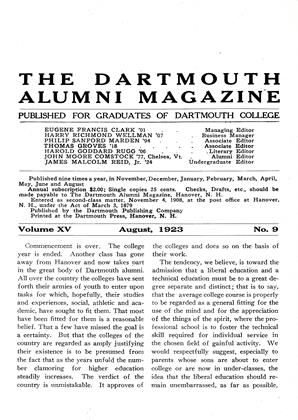by Ernest R. Groves '03, pp xiv-205. The University of Chicago Press, Chicago.
Again Professor Groves has given us a thoughtful study and analysis of the rural social mind, for the purpose of emphasizing its significance in our national life. In his preface the author says: "Rural people have a greater social function than merely to grow food for city dwellers. They also contribute to modern society attitudes of mind of indispensable value. Not that the country people are inherently different from city people. Living in a different environment they naturally develop characteristic habits of mind. National welfare needs their social influence, and for that reason the problem of rural prosperity is a matter of concern to all our people. Fortunately this fact is beginning to be recognized by all thoughtful leaders of public policies."
A larger part of the volume is taken up with a discussion of the drift to the cities which is becoming so alarming, and with a discussion of the social and psychological reason therefor. Certain instincts are then studied in their bearing on rural life, to each closely allied group a chapter is given. There is also a chapter, perhaps in some respects the best in the work, on "The Country Church and the Rural Mind," and the book closes with a discussion of the psychology of rural Organization.
To the reader who is a student of the rural problem rather than of modern psychology, the book appeals as practical, sane and scholarly. It is the fruit of careful observation in an environment which the resident of New Hampshire knows only too well, and contains conclusions based on these observations which are the fruit of ripe judgment and deep scholarship.
There is an ample use of statistics and each chapter closes with a brief but workable list of references.
A foreword by President Kenyon L. Butterfield, president of Massachusetts Agricultural College, adds value and authority to the work.
Rowell Foster Magill, 1916, is the author of the "Legal Advantage and Disadvantage of the Various Methods of Selling Goods on Credit" in the April issue of the CornellLaw Quarterly.
 View Full Issue
View Full Issue
More From This Issue
-
 Article
ArticleTHE REJOINDER OF JOAN
August 1923 By EDWIN J. BARTLETT '72 -
 Article
ArticleCommencement is over. The college year is ended.
August 1923 -
 Article
ArticleCOMMENCEMENT 1923
August 1923 By WILLIAM H. MCCARTER, 1919 -
 Article
ArticleCOLLEGE STUDENTS AND THE AVERAGE AGE
August 1923 By RICHARD WELLINGTON HUSBAND -
 Class Notes
Class NotesCLASS OF 1903
August 1923 By P.E. WHELDEN -
 Class Notes
Class NotesCLASS OF 1911
August 1923 By Prof. Nathaniel G. Burleigh
Books
-
 Books
BooksALUMNI PUBLICATIONS
May, 1922 -
 Books
BooksThe latest musical composition
MARCH 1932 -
 Books
BooksFaculty Notes
March 1948 -
 Books
BooksSoiled Pinstripes
October 1979 By DAVID M. SHRIBMAN '76 -
 Books
BooksCONTRARY COUNTRY
December 1950 By HERBERT F. WEST '22 -
 Books
BooksARCHAEOLOGICAL PAPERS,
April 1949 By John B. Stearns '16.

